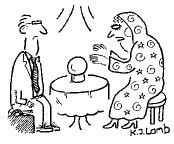The English fascination with spies is gloriously reflected in our literature, from Kim to A Question of Attribution, and while their Egyptian and Israeli counterparts remain untranslated, and the Americans unreadable, English spy novelists rule. Compromised, divided and alienated, the spy is a model modern hero, and the spy’s world, with its furtive and fetishistic arcana, is an admirable theatre of identity, of English attitudes to sex and class, hypocrisy and betrayal. (The best recent spy novel is John Banville’s The Untouchable, which tells the story of Anthony Blunt more freely than Alan Bennett’s play, nudging the facts into outrageous fiction — casting Graham Greene as the villain, for example.)
The Cambridge traitors are re-revisited in Charles Cumming’s The Trinity Six, a title with a premise: that besides Philby, Burgess, Maclean, Blunt and Cairncross, there was a Sixth Man, one Edward Crane, pronounced dead at St Mary’s, Paddington in 1992. The story begins 15 years later, with Sam Gaddis, a don at UCL, a tepidly lecherous smoker and drinker, divorced, up to his oxters in debt, and the author of a book attacking a certain gangster, war criminal and judoka, formerly of the KGB and currently President of Russia, named Sergei Platov. At his book’s launch party, at Daunt’s, Holland Park, Gaddis is approached by an attractive young woman …
One is not hugely surprised to learn — and all too soon, it seemed to me — that Eddie Crane is still alive, that Vladimir Pu-, sorry, Sergei Platov, cough, has a guilty secret, and that the two things are somehow mysteriously related. In Moscow, Berlin, Vienna and New Zealand, Gaddis follows a trail of interested parties, most of whom are killed immediately post-interview, and in one case mid-. There are helpful and vaguely fanciable women, and various spooks, Ours and Theirs.
The story of ‘The Magnificent Five’, as they were known in Moscow, is sketchily rehearsed, and reference made to Victor Rothschild, André Deutsch, Harold Wilson and Dick White, but none of it comes to life, and feels more like slightly wonky background verisimilitude — Burgess was at Trinity Hall, for example, not the College — than anything to do with the story.
I called The Untouchable a spy novel, but it is more a novel about spies. Most spy novels aren’t proper novels, which is why we celebrate John le Carré for writing ones that are. On the cover of this book, Robert Harris says that Cumming’s work reminds him ‘strongly of the early books of John le Carré’, which looks like a favour but really isn’t. The Trinity Six strikes me as a spy novel tout court, and not a particularly good one.
Le Carré’s work is re-readable because it has wit, grand architecture, resonant detail and fiendish subtlety. I found it a struggle to read The Trinity Six once. With le Carré one is invariably a few steps behind, with Cumming a few ahead. The crucial process of observation and deduction tends to the portentous and rather dim. What to make of this, for example?
Visible behind a plastic cover, perhaps so that Charlotte could press the purse against a ticket machine without the need to take it out, was an Oyster card.
I mean honestly, WTF?






Comments